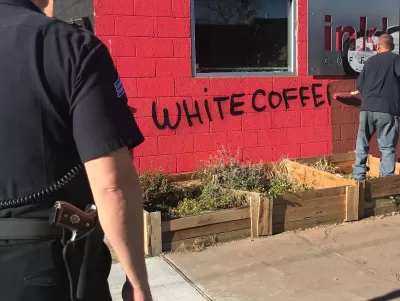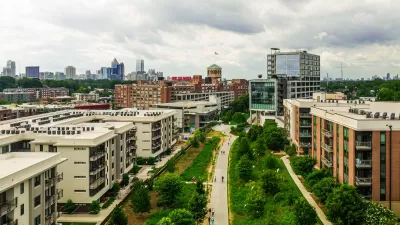Despite decades of our raising the issue of displacement in the face of rising rents, many Americans still do not see this as a call-to-action or a failure of public policy. Here is why our housing messaging may be backfiring.

Several weeks ago, social media ignited in outrage over a sign posted outside a small café in Denver. On one side, the sign read, “Happily Gentrifying the Neighborhood Since 2014”. On the other side it read: “Nothing says gentrification like being able to order a cortado.” The backlash from community advocates was swift.
The owners of this cafe probably did not intend to create the firestorm they started—they just wanted to sell more lattés—but their gentrification joke-misfire raises a larger, more troubling point: The economic plight of low-income Americans is worsening, and we do not have the public support we need to scale policies that would improve their well-being nor to improve the racially/ethnically segregated neighborhoods in which they live, without displacing them.
Generally, many Americans feel personally empathetic toward those who are struggling, yet our public policies reek of a growing antipathy toward the poor that is difficult to dislodge.
Many of the same people, who in our polls say that they are in favor of better housing solutions for residents, fail to support affordable housing developments when they are proposed in nearby neighborhoods, fail to support legislation that would make it possible to build, create, or preserve existing affordable housing, and fail to support the organizations trying to help low-income people in their communities.
Millions of people are being displaced from their homes because their incomes are not keeping pace with rising housing costs, yet there seems to be very little sustained appetite to address or correct this issue. When we try to raise awareness and offer potential solutions, we often find ourselves largely in conversation with ourselves.
The Denver café reminds us, quite painfully, that despite decades of raising the issue of displacement in the face of rising rents, many people still do not see this as a call-to-action or a failure of public policy. A cursory glance at the comments section of the New York Times article that covered the Denver story shows how ambivalent most people are about this issue.
A report titled You Don’t Have to Live Here examines why housing messaging is backfiring, and makes some concrete recommendations based on empirical evidence about how to change course.
FULL STORY: Who Gets to Live Where, and Why? The Answer May Lie in Our Messaging

Planetizen Federal Action Tracker
A weekly monitor of how Trump’s orders and actions are impacting planners and planning in America.

Restaurant Patios Were a Pandemic Win — Why Were They so Hard to Keep?
Social distancing requirements and changes in travel patterns prompted cities to pilot new uses for street and sidewalk space. Then it got complicated.

Map: Where Senate Republicans Want to Sell Your Public Lands
For public land advocates, the Senate Republicans’ proposal to sell millions of acres of public land in the West is “the biggest fight of their careers.”

Maui's Vacation Rental Debate Turns Ugly
Verbal attacks, misinformation campaigns and fistfights plague a high-stakes debate to convert thousands of vacation rentals into long-term housing.

San Francisco Suspends Traffic Calming Amidst Record Deaths
Citing “a challenging fiscal landscape,” the city will cease the program on the heels of 42 traffic deaths, including 24 pedestrians.

California Homeless Arrests, Citations Spike After Ruling
An investigation reveals that anti-homeless actions increased up to 500% after Grants Pass v. Johnson — even in cities claiming no policy change.
Urban Design for Planners 1: Software Tools
This six-course series explores essential urban design concepts using open source software and equips planners with the tools they need to participate fully in the urban design process.
Planning for Universal Design
Learn the tools for implementing Universal Design in planning regulations.
Heyer Gruel & Associates PA
JM Goldson LLC
Custer County Colorado
City of Camden Redevelopment Agency
City of Astoria
Transportation Research & Education Center (TREC) at Portland State University
Camden Redevelopment Agency
City of Claremont
Municipality of Princeton (NJ)





























